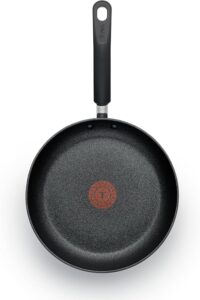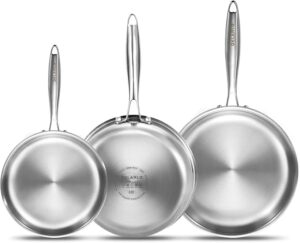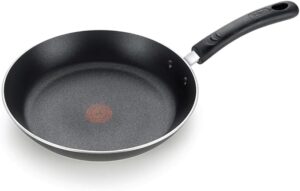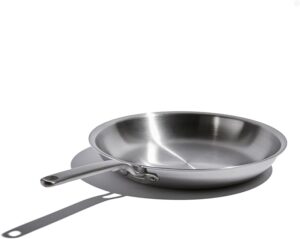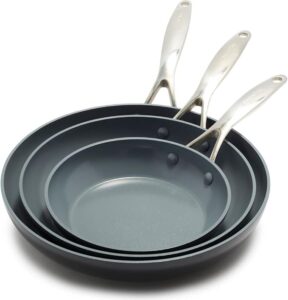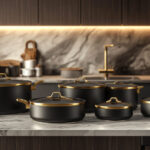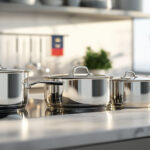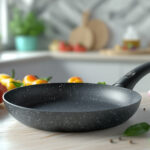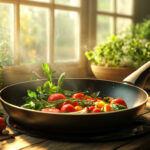Tefal Pans: Aluminum, Stainless Steel, or Cast Iron – Which Is Best for Your Kitchen?
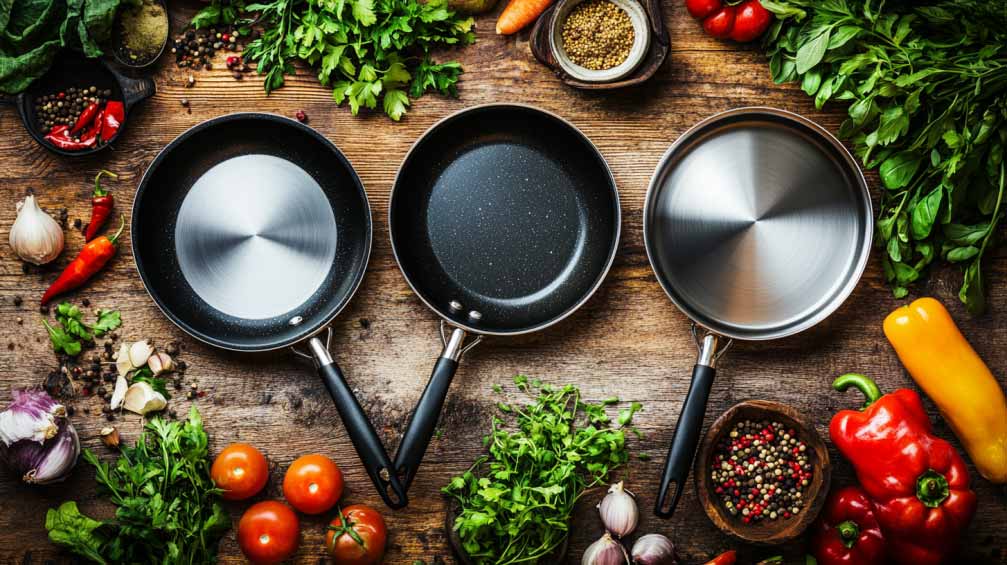
Speaking of cuisine, the right pan can make all the difference, and Tefal offers a variety of high-quality options to suit every kitchen. Be it frying, sautéing, or just simmering, choosing the right material for your cookware is really cardinal. Ranging from lightweight aluminum to durable stainless steel, to traditional cast iron, each material will bring along its own set of benefits. Now, in this post, we are going to discuss the advantages of Tefal aluminum pans, together with their siblings-stainless steel and cast iron-and see which one fits your cooking style and kitchen needs.
Understanding the Heat Conductivity of Aluminum Pans
Considering that aluminum has great heat conductivity, it has been highly valued. Because of this quality, Tefal aluminum pans make full use of this property when it comes to the kitchen. Being among those good materials that conduct heat quite well, aluminum distributes heat throughout the surface area evenly. In this way, one can completely remove all chances of a hot spot, ensuring your food cooks from edge to center with complete consistency. From searing meats to sautéing vegetables, these Tefal aluminum pans react promptly to temperature changes for better control of one’s cooking. This kind of response is crucial for those recipes that require precision in the adjustment of foods during their preparation.
Besides heat conductivity, Tefal aluminum pans are often enhanced by adding a non-stick coating to the material, thus further complementing its even heating ability. The non-stick layer prevents the food from sticking to the pan and reduces the amount of oil or butter needed, cleaning up easier afterward. The bottom made of aluminum will definitely get the pan hot in a very short time and ready for frying, simmering, or boiling. Be it the preparation of a light sauce or browning, the uniform heating prevents burning and hence assures you of a better cooking experience.
However, while it is a really good heat conductor, aluminum is also pretty soft and subject to scratches or warping over time. To that end, Tefal aluminum pans are often reinforced with additional layers or combined with other materials in pursuit of added durability. Most Tefal pans come with either anodized aluminum surface or bases in stainless steel; thus, while strengthening the pan, it keeps its superior heating distribution properties. This combination of conductivity, non-stick convenience, and durability makes the aluminum pans by Tefal versatile and essential instruments in any kitchen.
We also reccomend you to read: Cheapest Cookware Pots in 2024
Why Stainless Steel Pans Are Ideal for Durability
Among the most ideal things to bear in mind regarding the best material for cookware, stainless steel is incomparable because it comes with unrivaled durability. Unlike other materials, stainless steel is highly resistant against corrosion, rust, and staining, hence being suitable for long-term use in the kitchen. Its materiality can resist high temperatures without warping or degradation, which could be very helpful during searing, browning, or deglazing. This durability allows stainless steel pans to withstand heavy use and rough handling, whether you use metal utensils or transfer your cookware from stovetop to oven frequently.
Another reason why stainless steel is quite durable relates to its construction. Most stainless steel pans boast multi-layered construction, often including aluminum or copper cores for enhancing their thermal conductivity. This combination of stainless steel on the exterior with a conductive core ensures even heating, maintaining the strong points of the stainless steel. Unlike non-stick pans, which degrade through time and use, stainless steel does not peel or chip and promises longevity with continued performances through years of cooking.
Stainless steel cookware is liked is because of its versatility and low maintenance. It is non-reactive; it will not affect the flavor of acidic foods such as tomatoes or vinegar. Being dishwasher-safe, it is very easy to clean. This is what essentially makes stainless steel pans a great option for those who need steadfast, all-purpose cookware that can take different kinds of cooking methods and stand up to time. Whether you’re a professional chef or just a simple home cook, stainless steel is yet to find its equal in most aspects concerning toughness with cookware.
Cast Iron vs. Aluminum: Which One Retains Heat Better?
One of the first big differences one can notice between the two is that cast iron cookware is way better at holding the heat inside rather than letting it out, as aluminum does. It is extremely good for retaining the heat for quite a pretty long time; this makes it simply perfect for slow cooking, roasting, and any recipes that require a constant and even heat. It remains hot-very hot-when it heats up, even when food is placed into it, which is why it is used to sear steaks and bake dishes. On the other hand, aluminum does not retain the heat as well, though it is very good at conducting it. This means Tefal aluminum pans cool down more quickly once taken off the heat, or if ingredients have been added.
Where cast iron is ideal for dishes requiring constant, uniform heat, Tefal aluminum pans are more ideal concerning speed in adjusting heat. Compared to cast iron, aluminum generally has a much faster heating-up process, especially for tasks that involve rapid temperature changes like sautéing or frying fragile components. Because of the fact that aluminum loses heat a lot faster compared to cast iron, it may not necessarily be the best option for dishes that require extended cooking in stable temperatures. For example, braising or slow-cooking dishes would be better done with cast iron, but everyday cooking which requires much speed in heating and responsiveness is where the Tefal aluminum pans shine.
Whether cast iron or aluminum is used depends upon the cooking methodology and outcome. If it’s a question of retaining heat, cast iron is unmatched, but in heating up fast and responding to temperature changes, Tefal aluminum pans are fantastic. Both materials have their plus points, and basically understanding the heat retention characteristics of the two will help you decide on which one will suit your specific kitchen tasks.
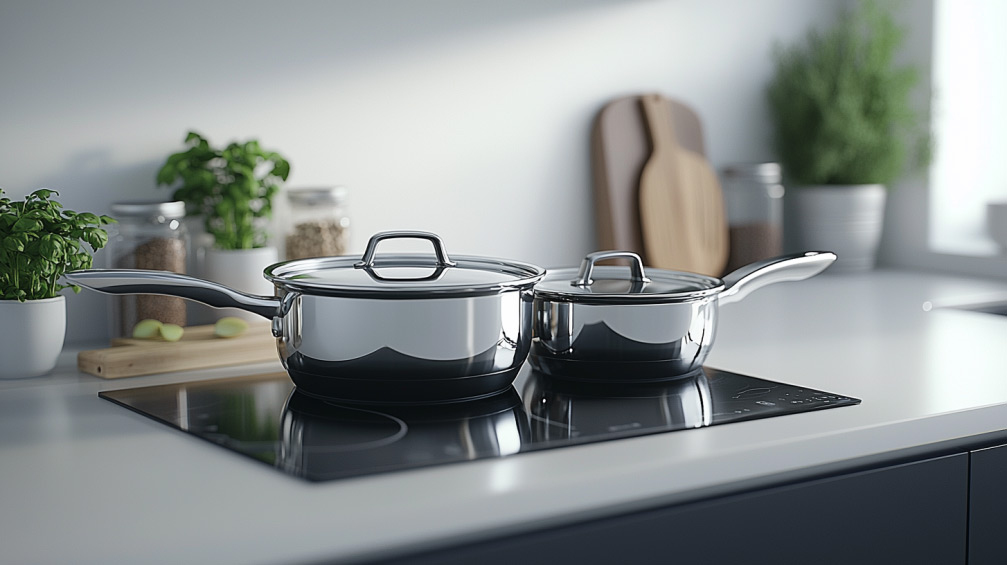
Non-Stick Coatings: Do They Affect Performance?
Apart from the materials themselves, a differentiation point that will be important in comparing stainless steel cookware with aluminum is the non-stick coating, really influencing the performance of your pans. For example, most Tefal aluminum pans are lined with a very good-quality non-stick layer, adding so much more convenience to daily cooking. Non-stick coatings make it easier to cook with minimal oil or butter, reduce the sticking of food, and easily clean. That makes the Tefal aluminum pans very suitable for tasks such as frying eggs or pancakes or sautéing tender ingredients like fish, which require food release to be smooth.
https://cookwarespace.com/stainless-steel-vs-nonstick/On the contrary, most stainless steel cookware isn’t coated, and thus, in cases of underheating or inadequate oiling of a pan, food is likely to stick. Although this may sound like a disadvantage, stainless steel pans are usually preferred for searing, browning, and deglazing because they offer better caramelization and development of the fond. These can add a depth of flavor to dishes, and that is why stainless steel can be best for professional-style cooking. Besides, the absence of a non-stick coating means stainless steel pans are capable of withstanding higher temperatures during cooking without degrading, while most non-stick aluminum pans are constrained to use only lower or moderate heat for preservation of the integrity of the coating.
However, non-stick coatings do have their own limitations, especially with Tefal aluminum pans. With time passing, the non-stick surfaces will deteriorate due to very substantial usage or poor maintenance of a non-stick pan, using a lot of metal utensils, or making the pan very hot. Aluminum allows quick and even heating, but how long the non-stick surface will last depends on the care given to the pan. It is strong and resistant to wear, however, making it preferable for cooks who value versatility with durability over the ease of non-stick performance.
Choosing the Right Material for Your Cooking Style
The right cookware material largely depends on the cooking style, and the strengths of different materials can guide one to make the best choice. Tefal aluminum pans are the best option for cooks who look at speed and convenience. Being among metals with excellent conductivity, aluminum is meant for frying, sautéing, or boiling-activities that require rapid heating. The light weight of the Tefal aluminum pans makes them easy to handle, whether you are flipping pancakes or tossing vegetables. Aluminum cookware suits your style well if your cooking tends to be fast-paced, everyday meals that call for ease and efficiency.
If you are into cooking methods involving browning, searing, or making sauces, all of which require deglazing, then perhaps you would be better off going with stainless steel. Unlike aluminum, stainless steel pans do not have a non-stick coating; hence, they allow for better caramelization and flavor development during cooking. This makes it perfect for professional-style dishes that are high-heat-intensive with a formidable yet responsive cooking surface. It is highly resistant to scratches, dents, or wear over time; it is dependable for cooks seeking durability and versatility in the kitchen.
More tips about teflon in: Ceramic vs Teflon Cookware: The Pros & Cons
However, for those cooks whose style tends toward slow cooking, braising, or dishes requiring long, even heat, cast iron can be superior to both aluminum and stainless steel. The advantage of cast iron is that it stores heat really well, holding a consistent temperature for quite some time, which is best for stews, roasts, or baking. After all, it comes to preference in how one would want to cook his meal and whether they shall use the Tefal aluminum pans, stainless steel, or even cast iron. So each of them has its major strengths, and picking up the right type will ensure a much more enjoyable and successful cooking experience.

